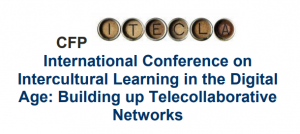The international conference on Intercultural Learning in the Digital Age: Building up Telecollaborative Networks and the Workshop on Gamification & Intercultural Learning will be held at both the University of Valencia and the
Polytechnic University of Valencia (Spain) from 7 to 9 November 2019.
The iTECLA research Project and the SILVA research group from the University of Valencia, together with the CAMILLE research group from the Polytechnic University of Valencia, are delighted to invite you to the conference and workshop to be held at the Faculty of Philology, Translation and Communication of the University of Valencia and the Department of Applied Linguistics of the Polytechnic University of Valencia, respectively.
The conference brings together educators, researchers, graduate students, and other professionals involved in the fields of Applied Linguistics and ComputerAssisted Language Learning worldwide. An optional extended paper or book chapter can be submitted for publication as a double-blind peer-reviewed contribution in a) a volume edited by Comares, which ranks 11th on the ILIACSIC Scholarly Publishers Indicators List of the most prestigious publishing
houses worldwide; b) The Eurocall Review (ISSN 1695-2618) or c) an IULMA Monograph published by the University of Valencia.
The theme of Intercultural Learning in the Digital Age covers areas including Telecollaboration or Virtual Exchange and Computer-Mediated Communication (CMC), intercultural communication, education for sustainable development, gamification, teacher education and professional development, open education, task design, digital literacies, digital games-based and problem-based learning, mobile-assisted learning, MOOC design and practice, open educational resources and practices, blended learning models, creative and innovative pedagogy, and student engagement.
The Intercultural Learning in the Digital Age international conference and the Workshop on Gamification & Intercultural Learning will discuss and explore how educational theories and practices are driving, responding to and facilitating intercultural communication and learning in the current digital age. Topics discussed will include: How are our educational systems changing in our current context of liquid modernity (Bauman, 2007), globalization and massive migratory movements across the globe? How are educators responding to the constant mobility and changes in relationships and identities within our highly complex societies? How can we cross global boundaries while promoting mutual understanding and critical values in the classroom? What will education and teaching be like once normalization (Bax, 2002) of ICT has been fully achieved? How will this digital immersion transform the ways and environments in which intercultural communication and learning take place? How can gamification, fan
fiction, etc. disclose new avenues to enhance intercultural communication and learner collaboration?
Keynote Speakers and workshop facilitators (in alphabetical
order):
Dr. Anke Berns, Universidad de Cádiz (Spain)
Dr. David Birch, Education First, Zurich (Switzerland)
Dr. Kristi Jauregi, Utrecht University (Netherlands)
Dr. Kurt Kohn, University of Tuebingen (Germany)
Dr. Robert O’Dowd, Universidad de León (Spain)
Dr. Marina Orsini-Jones, Coventry University (United Kingdom)
Dr. Shannon Sauro, Malmö University (Sweden)
Dr. Margarita Vinagre, Universidad Autónoma de Madrid (Spain)
Topics
Topics of interest include, but are not limited to, the following:
- Telecollaboration or virtual Exchange, CMC and global projects or initiatives
- Intercultural communication and transcultural dialogue
- Gamification
- Education for sustainable development
- Citizenship learning for inclusion, sociocultural diversity and gender
- Critical consciousness and critical pedagogy
- Foreign Languages and Languages for Specific Purposes
- Teacher education and professional development
- Open education
- Task design
- Digital literacies
- Digital games-based and problem-based learning
- Mobile-assisted learning
- Blended learning models
- MOOC design and practice
- Open educational resources and practices
- Creative and innovative pedagogy
- Student engagement
- Social media and democratic education in the foreign language classroom
Conference Details
- Venue: University of Valencia and the Polytechnic University of Valencia (Spain)
- Participation Fees: 120 € (includes conference fee 80 € and workshop fee 40 €)
Undergraduate, Master’s and PhD students: 90 € (includes conference fee 60 €
and workshop fee 30 €) - Registration: Early-bird registration finishes 1st September; registrations will be
accepted up to 15th October. - Conference Dates: 7th, 8th and 9th of November 2019
- Websites: http://itecla.uv.es/itecla-conference/ (conference) and http://eurocall.upv.es (workshop)
Important Dates
- Presentation of abstracts: deadline 31st March
- Notification of acceptance: 30th April
- Registration: up to 15th October
- Deadline for submission for an optional extended paper or book chapter: 30th May 2019
Organising Committee
Dr. Ana Sevilla-Pavón (Universitat de València – iTECLA & SILVA/IULMA)
Dr. Ana Gimeno-Sanz (Universitat Politècnica de València – CAMILLE)
Dr. Andreea Rosca (Universitat de València – iTECLA & SILVA/IULMA)
Local Organising Committee
Dr. Ferran Robles Sabater (Universitat de València/IULMA)
Dr. Rosa Giménez Moreno (Universitat de València/IULMA)
Dr. Rafael Seiz Ortiz (Universitat Politècnica de València – CAMILLE)
Dr. Alicia Ricart Vayá (Universitat de València – iTECLA & SILVA/IULMA)
Dr. Robert Martínez Carrasco (Universitat Jaume I/Universitat de València)
Dr. Francisco Ivorra Pérez (Universitat de València – iTECLA & SILVA/IULMA)
Dr. Beatriz Cerezo Merchán (Universitat de València – iTECLA & CiTRANS/UV)
Dr. David Perry (Universitat Politècnica de València – CAMILLE)
Guidelines for Submitting Abstracts
- Deadline: March 31st, 2018
- Abstracts: 350-400 words, using the abstract-template19 provided at http://itecla.uv.es
- Biographical Data: 50 words including full name, title and affiliation
- Presentation Format: Please clearly indicate whether you are submitting a proposal for a presentation or a poster (see details below)
Presentation Formats
- Presentations: Accepted papers will be divided into conference strands. Within each strand, presenters will be provided with 30-minute time-slots (20 min to present, 5 min to take questions, 5 min to accommodate room changes).
- Posters: We also welcome poster submissions to encourage researchers, and particularly graduate students and trainee teachers, to present their work. This poster section provides an additional platform to present and discuss topics, projects and research findings (preliminary or otherwise) which are immediately relevant to the thematic scope of the conference. Posters should be prepared in an A1 vertical format (594 x 841 mm, 23.4 x 33.1 in).
Submission guidelines
Send abstract (350-400 words, including title, keywords, and references) to itecla@uv.es, together with a brief iodata (max. 50 words). Please indicate the preferred type of presentation (poster or paper)

